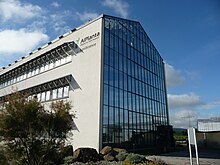Rural Service Center

The Rural Areas Service Centers (DLR) are lower state authorities in Rhineland-Palatinate , which are responsible for rural development, rural land management and settlement, vocational schools for agricultural disciplines, state advice, testing, nutritional advice, complementary research in viticulture , oenology and Carry out phytomedicine and other viticultural, horticultural and agricultural tasks. The six rural service centers in Rhineland-Palatinate perform these tasks with different priorities.
Because of the unity of state advice and school education, the vocational schools and technical schools for agricultural subjects are integrated into the rural service centers.
There are six rural service centers in Rhineland-Palatinate. You are in the division of the Ministry of Economy, Transport, Agriculture and Viticulture .
The individual service centers in rural areas
DLR Rheinpfalz
With its vocational school for viticulture and horticulture and the technical schools for horticulture as well as viticulture and oenology, the DLR Rheinpfalz in the Mußbach district of Neustadt an der Weinstrasse is a training and further education center for the profession in the Palatinate . This is also the location of the Rhineland-Palatinate Garden Academy .
DLR Eifel
The main tasks of DLR Eifel for the western part of the country are land development and rural land management, support for investment funding for farms, advice, further training and experimentation in animal husbandry, plant cultivation and grassland, nutritional advice and training. and training in agriculture.
The administrative headquarters are in Bitburg .
DLR Moselle
The main tasks of the DLR Mosel are land development and rural land management, investment and market support for agricultural businesses and viticulture advice for steep-slope viticulture . The most recent example is the development of a steep-slope grape harvester , which the Rhineland-Palatinate Ministry of Viticulture presented in September 2007. Thanks to the combination of the most modern techniques, it is able to harvest up to 60% steep vineyards. Due to the importance of steep-slope viticulture as an economic factor for viticulture in Rhineland-Palatinate, especially on the Moselle, the development of such a device was initiated on the initiative of the Viticulture Ministry , the Service Center for Rural Area Mosel and the Winzergenossenschaft Moselland e. G. commissioned.
The administrative seat is in Bernkastel-Kues .
DLR Rheinhessen-Nahe-Hunsrück

An important task of the Service Center Rural Area Rheinhessen - Nahe - Hunsrück is the solid school education of the young farmers and winemakers, supplemented by an attractive advisory and further training offer in production-related questions of agriculture and viticulture, which is based on an extensive and practice-related test system.
The DLR maintains local offices in Bad Kreuznach (central administration, focus on viticulture and agriculture), in Oppenheim (focus on viticulture) and a branch in Simmern (focus on land management and the Rhineland-Palatinate rural area academy ).
DLR Westerwald-East Eifel
The DLR Westerwald - Osteifel is responsible for the development of rural areas with a focus on land development and rural land management, agricultural advice and agricultural testing.
The central administration is in Montabaur , two offices are in Mayen .
DLR West Palatinate
The management and administration of the DLR West Palatinate is carried out from Kaiserslautern . The matters of land development and rural land management are also dealt with there. DLR West Palatinate is a service provider for integrated rural development and corresponding implementation strategies in the area of land development and rural land management.
Web links
- DLR Rheinpfalz
- DLR Eifel
- DLR Moselle
- DLR Rheinhessen-Nahe-Hunsrück
- DLR Westerwald-East Eifel
- DLR West Palatinate
- Rhineland-Palatinate Garden Academy
- Rural Academy Rhineland-Palatinate
